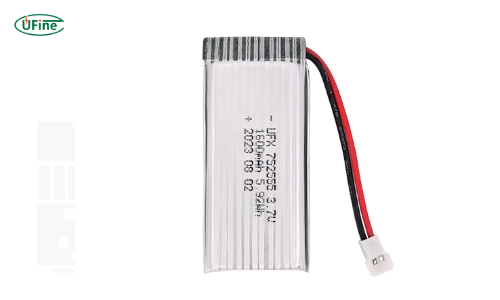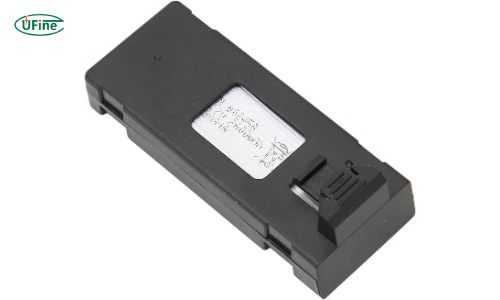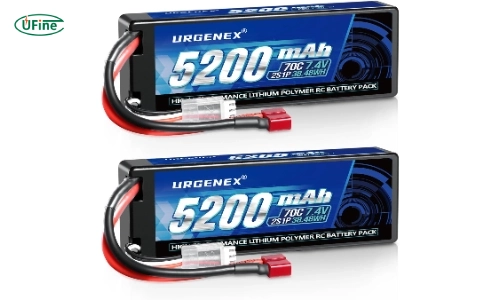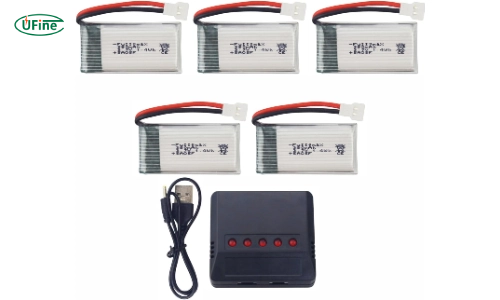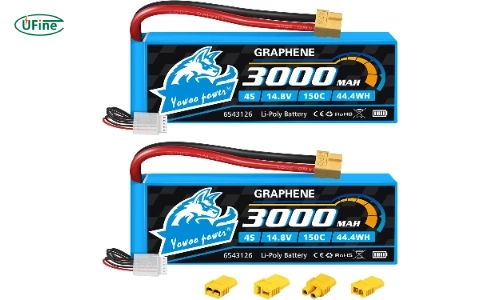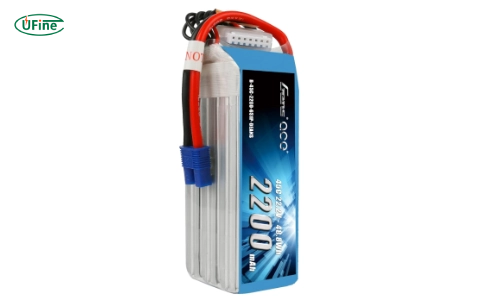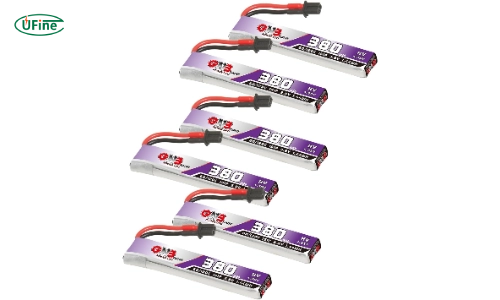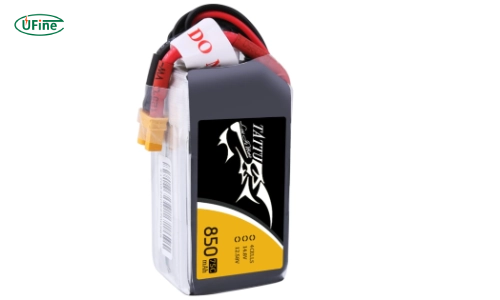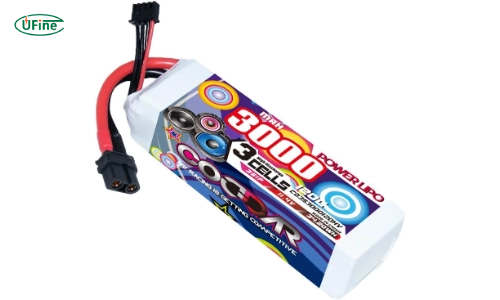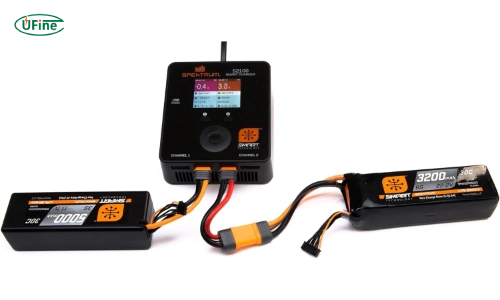Looking for the best drone batteries for 2025? Choosing the perfect drone battery can be tricky, given the numerous options available in the market. Whether you’re looking for batteries with long flight times or high discharge rates, this guide reviews the top drone batteries to help you make an informed decision.
Part 1. Different Types of Drone Batteries: LiPo vs Li-ion and More
Before diving into the best drone battery options, it’s crucial to understand the different types available. Each type of battery comes with its own set of advantages and limitations, and choosing the right one can significantly impact your drone’s performance, flight time, and overall usability.
Lithium Polymer (LiPo) Batteries
LiPo batteries are the most common choice for drones today, known for their high energy density, lightweight design, and high current capability. These characteristics make them ideal for racing drones and high-performance models, where quick bursts of power during take-off and maneuvering are essential.
However, LiPo batteries require careful handling and storage to ensure safety and longevity. Improper care can lead to potential hazards, making them less beginner-friendly compared to other types.
Nickel Metal Hydride (NiMH) Batteries
NiMH batteries are more commonly found in older drone models. While they are durable and robust, they are also heavier and have a lower energy density compared to LiPo batteries. This results in shorter flight times and reduced performance, which is why they are less popular in modern drone designs.
Lithium-ion (Li-ion) Batteries
Li-ion batteries are prized for their longer lifespan and greater stability compared to LiPo batteries. They are best suited for applications where endurance and consistent performance are prioritized, such as aerial photography or surveillance drones. This makes them a great choice for enthusiasts seeking longer flight times and enhanced durability, rather than extreme performance.
While they lack the high-discharge capability of LiPo batteries, their ability to deliver steady energy makes them a reliable and safe option for many users.
Lithium Iron Phosphate (LiFePO4) Batteries
LiFePO4 batteries are a relatively new entrant in the drone battery market. They strike a balance between safety, long lifespan, and steady performance. Unlike LiPo batteries, they are less prone to overheating, making them a safer choice, especially for beginners.
That said, their lower energy density and heavier weight mean they are not ideal for high-performance drones, but they are excellent for recreational or training purposes.
Li-ion batteries are great for those seeking longer flight times and enhanced durability, making them one of the top choices for drone enthusiasts looking for stability over extreme performance. On the other hand, LiPo (Lithium Polymer) batteries, with their lightweight and high-discharge capabilities, are often preferred for racing drones and high-performance models.
Now that you understand the differences between drone battery types, let’s explore the top 10 drone batteries you can consider for your needs.
How to Charge Drone Battery?How Long Does A Drone Battery Last?
Part 2. Top 10 best drone batteries for performance and endurance
Hundreds of drone batteries are available on the market, but most are just a waste of money. So, to help you, we have tested and reviewed the top 10 best drone batteries you can choose from:
1. Ufine 3.7 V 1600mAh High Rate Discharge Battery 752555-20C
Specifications:
- Voltage: 3.7V
- Capacity: 1600mAh
- Discharge Rate: 20C
- Dimensions: 52 x 25.5 x 5.5 mm
- Weight: 37g
- Operating Temperature: -20°C to 60°C
Pros:
- High discharge rate for quick power bursts
- Compact design suitable for space-limited drones
- Long cycle life with over 500 cycles
- Wide operating temperature range
- Lightweight
- Maintains over 80% capacity after 500 cycles
Cons:
- Requires a specific charger due to high discharge capabilities
- Limited to drones that can handle the high discharge rate
2. ASHATA RC Drone Battery, 3.7V 2600mAh
Specifications:
- Voltage: 3.7V
- Capacity: 2600mAh
- Material: ABS plastic
- Weight: 45g
- Dimensions: 66 x 18 x 18 mm
Pros:
- High capacity for extended flight times
- Durable ABS plastic casing
- Compatible with a variety of drone models
- Easy to transport with protective casing
- Provides stable power output
- Reasonably priced
Cons:
- Lower discharge rate compared to high-rate batteries
- Bulkier design
- It may not fit all drone models due to size
3. URGENEX 7.4V 5200mAh Lipo Battery
Specifications:
- Voltage: 7.4V
- Capacity: 5200mAh
- Discharge Rate: 70C
- Connector: Deans T plug
- Dimensions: 139 x 47 x 25 mm
- Weight: 308g
Pros:
- High capacity for longer flight times
- High discharge rate for peak performance
- Suitable for high-demand applications
- Robust lifespan with at least 500 cycles
- Dean T plug compatibility
Cons:
- Heavy and bulky
- Requires a compatible connector or adapter
- It may not fit smaller drones
4. Fytoo 5PCS 3.7V 380mAh Lithium Battery
Specifications:
- Voltage: 3.7V
- Capacity: 380mAh
- Number of Batteries: 5
- Weight: 10g each
- Dimensions: 39 x 20 x 7 mm
Pros:
- Cost-effective multi-pack
- Lightweight and small size
- Includes a 5-in-1 charger
- Convenient for frequent flying sessions
- Suitable for smaller drones
Cons:
- Lower individual capacity requires frequent swaps
- Longer overall charging time
- Limited to small drones
5. Yowoo 2 Packs 4S Lipo Battery 3000mAh 150C 14.8V
Specifications:
- Voltage: 14.8V
- Capacity: 3000mAh
- Discharge Rate: 150C
- Configuration: 4S
- Weight: 362g
- Dimensions: 137 x 44 x 34 mm
Pros:
- High discharge rate for advanced drones
- Substantial capacity for long flights
- Graphene construction for increased efficiency
- Durable and long-lasting
- Suitable for high-performance maneuvers
Cons:
- Higher price point
- Heavy and large
- Requires drones compatible with 4S configuration
6. Gens ace 6S lipo Battery 22.2V 2200mAh 45C Lipo Battery
Specifications:
- Voltage: 22.2V
- Capacity: 2200mAh
- Discharge Rate: 45C
- Configuration: 6S
- Weight: 365g
- Dimensions: 105 x 34 x 44 mm
Pros:
- High voltage for powerful performance
- Reliable discharge rate
- Suitable for various remote-controlled applications
- Durable and long-lasting
- Consistent power delivery
Cons:
- Higher voltage is not compatible with all drones
- Heavy and bulky
- Requires a compatible charger
7. GAONENG 6pcs GNB LiPo Battery 1S 380mAh 3.8V 60C 120C
Specifications:
- Voltage: 3.8V
- Capacity: 380mAh
- Discharge Rate: 60C (120C burst)
- Configuration: 1S
- Weight: 10g each
- Dimensions: 40 x 11 x 7 mm
Pros:
- Small size and lightweight
- High discharge rate for quick power bursts
- Ideal for FPV drones
- Cost-effective multi-pack
- Reliable performance
Cons:
- Lower capacity requires frequent recharging
- Limited to small drones
- Requires compatible charging equipment
8. Tattu 14.8V 4S 75C 850mAh LiPo Battery Pack
Specifications:
- Voltage: 14.8V
- Capacity: 850mAh
- Discharge Rate: 75C
- Configuration: 4S
- Weight: 100g
- Dimensions: 72 x 35 x 23 mm
Pros:
- High discharge rate for peak performance
- Compact size for racing drones
- Reliable power delivery
- Suitable for FPV racing
- Durable and long-lasting
Cons:
- Lower capacity limits flight time
- Designed specifically for high-performance drones
- Requires a compatible charger
9. CODDAR 3000mAh 3S 11.4V 120C HV LiPo Battery
Specifications:
- Voltage: 11.4V
- Capacity: 3000mAh
- Discharge Rate: 120C
- Configuration: 3S
- Weight: 350g
- Dimensions: 138 x 45 x 25 mm
Pros:
- High capacity for extended flight times
- High discharge rate for consistent performance
- Suitable for larger drones
- Durable and reliable
- Consistent power delivery
Cons:
- Larger size and weight
- Requires a compatible drone model
- Higher price point
10. Spektrum Smart RC LiPo Battery Pack: 2200mAh 4S 14.8V 30C
Specifications:
- Voltage: 14.8V
- Capacity: 2200mAh
- Discharge Rate: 30C
- Configuration: 4S
- Weight: 198g
- Dimensions: 105 x 34 x 32 mm
Pros:
- Innovative technology for easy charging and management
- Moderate capacity and discharge rate
- Durable and long-lasting
- Ideal for hobbyists
- Reliable performance
Cons:
- Innovative features may not be necessary for all users
- Moderate discharge rate not suitable for high-performance needs
- Requires compatible charging equipment
Part 3. How to choose the right drone battery for your needs?
Selecting the correct drone battery is crucial for optimizing your drone’s performance and flight time. Here are the key factors to consider when choosing drone batteries:
Capacity (mAh):
The capacity of a battery, measured in milliamp hours (mAh), determines how long your drone can fly on a single charge. Higher capacity batteries generally provide longer flight times but can be bulkier and heavier.
Voltage (V):
The voltage of the battery must match your drone’s specifications. Higher voltage batteries can provide more power, which is beneficial for performance-intensive tasks but may not be compatible with all drones.
Discharge Rate (C):
The discharge rate indicates how quickly the battery can deliver power. A higher discharge rate is essential for high-performance drones that require rapid power bursts, such as racing drones.
Weight and Size:
The physical dimensions and weight of the battery must fit within your drone’s design constraints. Heavier batteries can affect flight dynamics and reduce maneuverability.
Battery Chemistry:
Lithium Polymer (LiPo) batteries are commonly used in drones due to their high energy density and lightweight. However, they require careful handling and maintenance to ensure safety and longevity.
Cycle Life:
Consider the number of charge and discharge cycles the battery can endure before its performance degrades significantly. A longer cycle life means more flights before needing a replacement.
Price:
Balance your budget with your performance needs. While higher-end batteries offer better performance and longer life, they come at a higher cost.
Compatibility:
Ensure the battery is compatible with your drone model and charging equipment. Check the connector type and voltage requirements to avoid any mismatches.
Choosing Between High-Capacity vs. High-Discharge Rate Batteries
When shopping for drone batteries, you must decide between a high-capacity battery for longer flight times or a high discharge rate for peak performance. High-capacity batteries, like the 3000mAh LiPo options, are great for casual flying, while high-discharge batteries are better for racing drones or fast-paced aerial maneuvers.
How to Choose LiPo Battery for a Drone?
Part 4. Tips for maintaining your drone battery for longer flight times
Proper maintenance and handling of drone batteries can significantly extend their lifespan and ensure consistent performance.
Here are some tips for maintaining and extending your drone battery life:
- Regularly Charge and Discharge: Avoid letting your battery fully discharge or remain fully charged for extended periods. Aim to store the battery at around 50% charge if not used for a while.
- Avoid Extreme Temperatures: Store and operate your batteries within the recommended temperature range. Extreme cold can reduce capacity, while extreme heat can damage the battery cells.
- Use a Proper Charger: Always use a charger designed for your specific battery type and specifications. Improper charging can lead to overheating, swelling, or even fires.
- Balance Charging: A balance charger ensures all cells are charged evenly for LiPo batteries. This helps maintain the overall health and performance of the battery.
- Regular Inspection: Before each flight, inspect the battery for any signs of damage, swelling, or leaks. Please do not use a damaged battery, as it poses safety risks.
- Handle with Care: Avoid dropping or puncturing the battery. Physical damage can lead to internal short circuits, causing the battery to fail or catch fire.
- Follow Manufacturer Guidelines: Adhere to the manufacturer’s instructions for charging, discharging, and storing your batteries. Each battery may have specific requirements to ensure optimal performance and safety.
Part 5. FAQs
-
How should I store my drone batteries best when not flying?
Store drone batteries in a cool, dry place with a storage charge of approximately 50%. Store them away from extreme temperatures and humidity to limit the degradation of the battery cells. Keeping them in a fireproof storage bag is also recommended as an extra safety measure. -
How do I know if my drone battery is failing?
These include reduced flight times, swelling, visible damage, difficulty maintaining a charge, etc. Replacing the battery is advised in case any of these problems arise to alleviate a potential safety risk. -
Would it be possible to go for a higher capacity battery than the one the manufacturer recommends for my UAV?
Using a higher capacity battery for extending the flight length might increase the additional weight of the drone and, hence, alter the balance and performance of the drone. Check that your drone tolerates a larger battery and does not tip to the maximum weight limit. -
Why is the drone’s battery hot while charging or using it in the air?
Batteries will naturally become warm while charging or under high use. Still, if they are becoming very hot, it may indicate a problem. You must check the usage of your charger and check if it is damaged. If an alerted battery becomes too hot to touch, discontinue use with the battery and look inside for possible defects. -
What are the best drone batteries for long flight times?
For drones used in aerial photography or long-distance flights, high-capacity lithium-ion batteries like the Li-ion 5200mAh options are ideal for maximizing flight duration without sacrificing stability. -
Are third-party batteries compatible with my doing?
Third-party batteries are the cheapest and can still be the best. Still, they should meet all specifications and quality as best as possible. Poorly made batteries can indeed be dangerous and could offer uneven performance. Be sure to buy from reputed manufacturers and sellers.
Related Tags:
More Articles
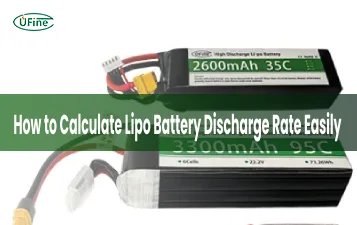
LiPo Battery Discharge Rate Guide & Calculation Tips
Understand LiPo battery discharge rates, C-ratings, and how to calculate max current. Essential guide for RC, drones, and electronics users.
High‑Capacity 3S LiPo Batteries: 5000 mAh vs. 10000 mAh
Compare 3S LiPo 5000mAh vs 10000mAh batteries by weight, power, and use. Find the best fit for your drone, RC car, or boat setup.
Top 5 Applications for Small 3S LiPo Batteries
Small 3S LiPo batteries power drones, RC gear, wearables, and robotics with high energy and low weight. Making them ideal for compact electronics projects.
Building and Charging Your Own 3S LiPo Pack: A Step‑by‑Step Guide
Learn how to build, balance, and charge a 3S LiPo battery pack safely at home with this complete DIY guide for hobbyists and beginners.
How to Choose the Right LiPo Battery Plug Type?
Discover the best LiPo battery plug types, how to choose them, and expert tips for safe usage, soldering, and maintenance.
